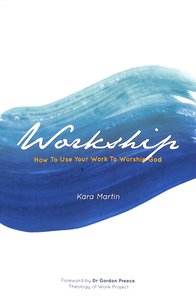Book review: Workship
Disclaimer: This article is the opinion of the author and does not necessarily reflect that of all Teachers' Christian Fellowship members.
Book Review - Kara Martin, Workship: how to use your work to worhip God
Graceworks Pty Ltd 2017, Available from Koorong. Price $22 approximately.

There are few Christian books that tackle the issues surrounding Christians and work. This new publication by Kara Martin is both comprehensive and challenging. It does not lumber under the weight of theological argument but expands on the theology to explore pathways to practical dimensions of work and uses concrete examples.
Martin uses the title Workship which comes from combining the two meanings of the Hebrew root - work and service, our work should both honour and worship God and serve God and others. The book is constructed in three section – A Biblical view of work, Spiritual disciplines of work and Practical wisdom for working.
A Biblical view of work outlines six perspectives: Work as gift, a good thing, cursed and who redeems work? righteous working and eternal work. The Biblical referencing and reasoning is both scholarly and practical. Martin not only includes examples from everyday life but provides for each chapter a prayer and questions for Taking it further. I found the chapter on Righteous working particularly helpful because it provides a framework with characteristics and work implications for dimensions under the titles of US focussing on God and our relationship with him, IN looking at personal qualities and OUT which focuses on social justice.
In the Spiritual disciplines of work, Martin outlines – Holy working, Gospel working, Prayerful working, Incarnational working, Spirit empowered working and Social justice working. Again each section has practical examples and finishes with a prayer and Take it further questions.
As teachers and educators in a rapidly changing work environment, the last section Practical wisdom for working is extremely challenging. Martin tackles the issues of Vocation, Work and identity, Working relationships and Kingdom business. My questions from reading this section are: Is teaching still considered a “vocation”? Are Christians called into teaching? Is the identity of Christians increasingly being defined by their work? Is Kingdom business only direct Gospel presentation and witness? At a time when Christians teachers are feeling the pressure of increasing secularism, are they more prone to hang up their faith at the classroom or staffroom door?
Workship finishes with some Appendices of a practical nature relating to applying spiritual disciplines for work. In all, this is a book of insight and challenge which although comprehensively theological is practical in nature.
John Gore